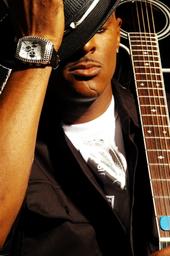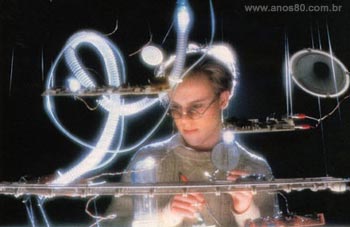Sunday, April 30, 2006
Thursday, April 20, 2006
high fidelity

Published in The Stranger on 4/20!
Ring a Bell?
Visionary Scientist Thomas Dolby Returns
BY TAMARA PALMER
Blame Thomas Dolby if cell-phone ringtones piss you off. Nah, he didn't write that egregious "Crazy Frog" tune. But the '80s synthpop legend best known for the international hit "She Blinded Me with Science" is responsible for the polyphonic squawking of mobile devices worldwide, thanks to audio software developed by his company Beatnik.
The man who titled his debut album The Golden Age of Wireless in 1982 and who influenced a generation of electronic-based producers would later become a tech visionary of another sort: Beatnik's innovations are licensed by companies including Motorola, Nokia, and Samsung.
Beatnik launched in 1996 as a spinoff of Headspace, which started three years earlier. "Beatnik was the name of our most popular product, so we eventually changed the name of the company," Dolby explains in an interview at a restaurant in Half Moon Bay, a coastside town 30 miles south of San Francisco. He lives there with his wife, former actress Kathleen Beller (whose resumé includes a two-year stint on Dynasty), and their three children.
He sits on the Beatnik board, but doesn't get much more involved than that. Music—not business—is still at the heart of Dolby's life. "Besides, I definitely don't have anything useful to contribute at this point," he demurs.
His phone rings just then; it's a jarring and horrible noise. And it's great.
Egyptian-born Thomas "Dolby" Robertson is on his first tour in 15 years, a back-to-basics, one-man show that revisits catalog favorites. But this won't be a rote laptop performance. Dolby doesn't just push buttons; he plays live. "At the end of the day, it's riskier, but more gratifying," he says.
It's been considerably longer than 15 years since he has interfaced with the major-label music business, a machine he calls "dysfunctional." For someone who made hit records by being experimental, Dolby wasn't encouraged by his label to continue that line of thinking once he had become a pop star. He found himself victim of a misguided focus-group mentality, where a typical marketing strategy for an album would be a full-page ad in Billboard followed by a lavish release party in Las Vegas when the tour came through there.
"It was basic ignorance, at my expense," he says now. "And I was expected to foot the bill for their childish marketing experiments."
These days, Dolby is much more excited about independent, internet-based outlets such as CD Baby, which allow an artist to make a significant amount per CD and enjoy the benefits of digital-based distribution without signing over all rights. Eight years ago, he released the Forties project via CD Baby to celebrate his 40th birthday. Every person who bought the CD left his or her name and a comment on his page. "Every sale!" he marvels. "It doesn't take a marketing genius to understand that this is something valuable."
Disdain for the music business made Dolby pull back from it, but the intervening years have deepened his feelings for his creations. And thus he is touring again, despite the rough economic reality and risks involved. Why now? "I miss my songs," he says simply.
"Thomas has that unique ability to infuse dry humor into even the most moody, introspective songs," says Seattle's Paul Sebastien of the duo Basic Pleasure Model, who open for Dolby at Fenix Underground. "His lyrics can transport you to another place, and then suddenly you'll pick up on a reference or quip that is just incredibly perceptive."
One of the new songs Dolby has recently completed is a collaboration with J. J. Abrams, the moonlighting creator of Lost, Alias, and Felicity, for the Abrams-directed Mission Impossible III. But mainly he's got a storehouse of vivid compositions firmly in his head.
After Dolby finishes this tour, he says, some of those tunes will be let out of his mind and into the ether. He may release a CD and/or DVD of the tour. As he envisions it, these new, pressure-free songs (and updated arrangements of old classics) will communicate directly with core fans without first having to run them up the corporate flagpole for approval.
There may be one overlooked focus group with which he has to contend, however: the whales he sees from the window of his recording studio/garden shed. They're surely tuned into his subsonic frequencies. And who knows? Thomas Dolby's golden age of whale song may soon be upon us.
Sunday, April 16, 2006
my heart is like a marching band

I have an interview with Scar in the new issue of Ozone. Those unfamiliar with the Atlanta-based singer should know the man that OutKast's Big Boi calls the "secret weapon" of his Purple Ribbon label. I defy anyone to not be inspired by his tale of talent, focus, and hard work.
Look for Scar to play a prominent role in the soundtrack for OutKast's forthcoming soundtrack to their Idlewild musical.
OutKast featuring Scar - "Morris Brown"
powered by ODEO
Friday, April 07, 2006
the power of the web, indeed. . .

Even though I challenged a fifth-grade classmate to a bit of a misguided "break-off" in 1983, the roots of electronic music run even a little bit deeper through my veins in terms of early impact. And so, after the last few wonderful years of focusing heavily on hip-hop, it was a delight to interview one of my favorite electronic producers of all time, Thomas Dolby, for an upcoming article in Seattle alt-weekly paper The Stranger (helmed by the inimitible and most awesome Dan Savage).
I didn't know that Dolby lived in the Bay Area (though I suspected he might, because I had heard about his work in Silicon Valley). I especially didn't know he lived in my favorite coastal town near here, the place I escape for good food and good air. Despite some recent opportunities, my location in SF means that so many of the interviews I do for work are not in-person, so this was something I was looking forward to doing.
I have been wanting to write something about the interview in advance of the story dropping in a few weeks, but before I could do so, I happened to check Dolby's Web site for the first time in probably about eight or nine years. He's got a new blog, and this was his entry from the end of the day on Wednesday:
*
Journalists
I did a bunch of interviews today for the tour, and for the most part the writers were very enthusiastic. I ended up at a protracted afternoon-tea-becomes-early-dinner session at a local inn with first The Stranger, a cool edgy Seattle music mag, segueing into the Chicago Tribune. Both surprised me with well-informed questions that indicated they had a genuine interest in my music, as well as respecting my reasons for taking 15 years “off”. Thankfully they all steered clear of, or were unaware of, the K-Fed saga and focused instead on why I chose now to come back, and what my plans are for the tour and for new music releases. One exception was MTV News who called for a quote about my favorite toy boy rapper. They published the article this afternoon and called the K-fed camp as well, who announced his song has been taken down from MySpace. Success! That’s the power of the Web. Hopefully it will now simmer down and I can get back to rehearsal.
*
I knew about K-Fed, but he didn't seem too happy about it, so I didn't talk about it. It's not worth giving up any of the column space to discuss it.
Writers often wonder if their interview subjects enjoyed our conversations with them. What a treat to find out for sure that someone did!

